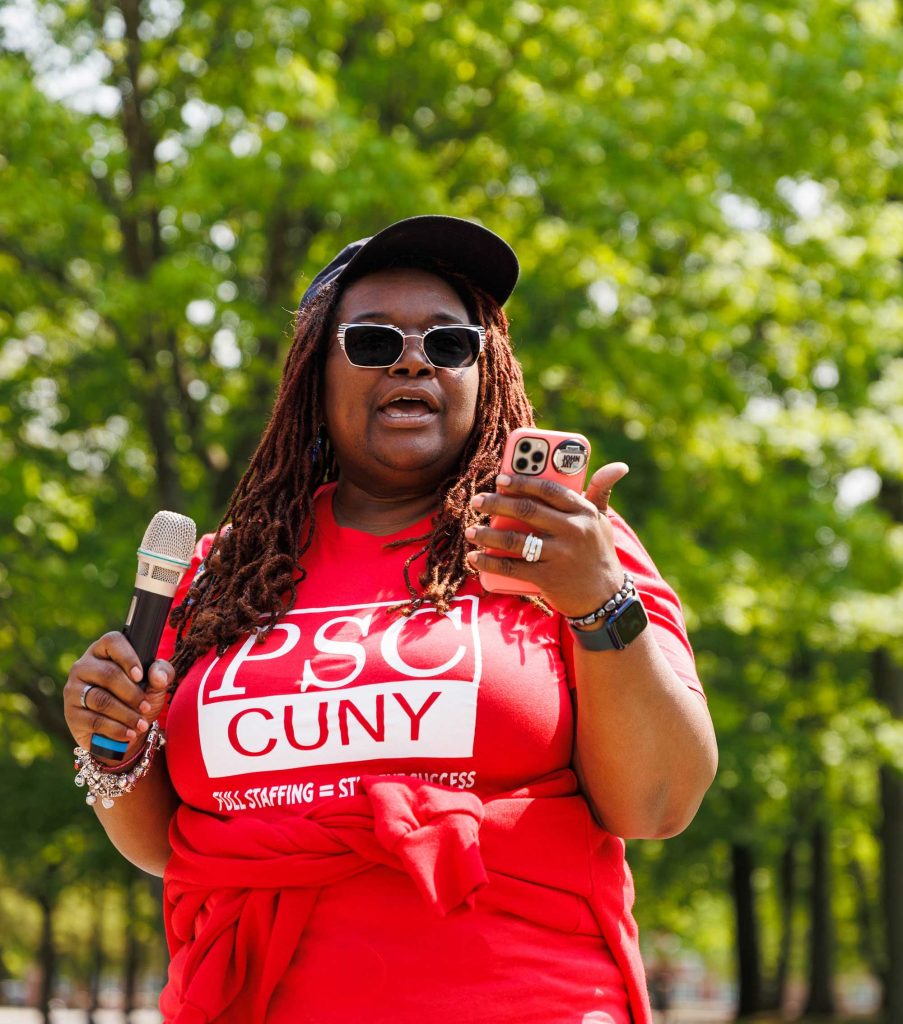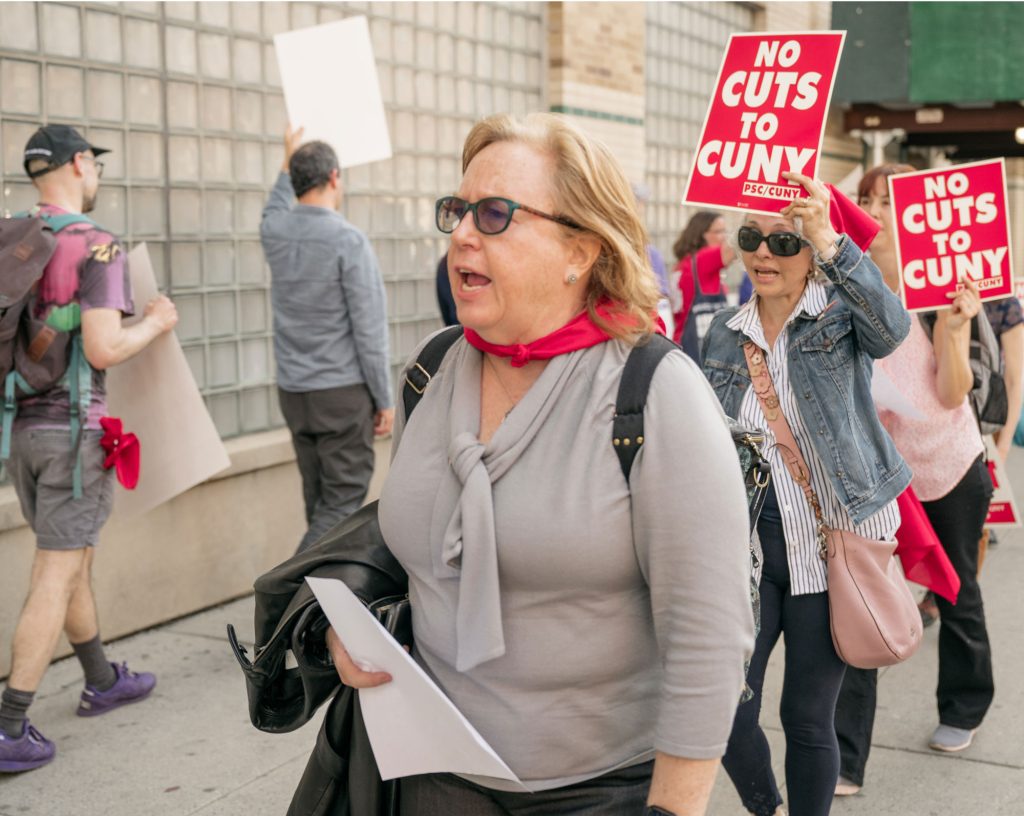
Rulisa Galloway-Perry says HEOs rose up to the challenge of remote work. (Credit: Paul Frangipane)
In a victory for CUNY professional staff and library faculty, the University has agreed to extend the remote work agreement (RWA) by one year. The agreement, which was set to expire this summer, came into being as a safety measure during the Covid pandemic and ensures that many HEOs, library faculty and college laboratory technicians can maintain hybrid schedules.
Now comes the next step: The union is fighting to codify the right to remote work in the next PSC-CUNY contract.
The union, like many groups advocating for workers in the post-pandemic landscape, is advocating for flexible hybrid scheduling for nonteaching members.
“We went remote for 18 months leaving the in-person, five-day work week behind. We all learned how to navigate the COVID reality of our workforce,” said Lucy McIntyre, PSC chapter chair for the CUNY Central Office and a cross-campus officer on the PSC Executive Council. “The world as we knew it changed. By extending and agreeing to a hybrid agreement, we allow for employees to maintain a healthy work-life balance, reduce our emission imprint by not traveling five days a week, reduce commuting expenses and help utilize the time not spent commuting on other important commitments we all have,” she said.
EMPLOYEE RETENTION
Hybrid scheduling in higher education is a complex issue, as universities are brick-and-mortar institutions premised on in-person learning and interaction. But studies show the benefits of flexible work. Numerous reports since the pandemic upended office life have shown that employers benefit from hybrid and flexible work schedules because they increase employee retention, and McIntrye agrees that this has played out at CUNY. “We believe that a good percentage of employees ages 22–45 have left CUNY for online jobs,” she said. “We have to adapt to our new world, and I strongly support a permanent hybrid work schedule.”
Forbes reported that “Teleworkers are an average of 35–40% more productive than their office counterparts and have measured an output increase of at least 4.4%.” The article went on to say that “54% of employees [said] they would change jobs for one that offered them more flexibility, which [resulted] in an average of 12% turnover reduction after a remote work agreement [was] offered.” Psychology Today noted that at one private-sector workplace, remote options allowed employees “to focus on their tasks without the distractions of an office environment,” which “led to a noticeable improvement in the quality of work and a reduction in turnover rates.”
“HEOs have earned the right to work remotely since we had to teach ourselves to work remotely without much help from the administration and have proven that we can do anything we want once we are faced with a challenge,” said Rulisa Galloway-Perry, the PSC chapter co-chair for HEOs. “We are the professional staff of CUNY who oversee the majority of the departments and supervises most of the employees at the college. HEOs are well respected by our peers and show up every day to make CUNY work.”
VIRTUAL WORK
For Mariana Regalado, chair of the PSC Library Faculty Committee, a lot of nonteaching work at CUNY has evolved since the Spring of 2020 to encompass remote scheduling, thus making hybrid and flexible schedules a common sense solution.
“More than ever, much of our work is now conducted using computers and via online meetings, including library services such as Chat Reference, Zoom-based research consultations and online library research instruction. Many virtual tasks such as these can be done better remotely,” she told Clarion in an email. “Working remotely can allow library faculty to gain crucial insight into how our services, website, etc., are serving or not serving students who are taking completely online (synchronous and asynchronous) and hybrid courses. CUNY is moving toward offering more online courses (i.e., through CUNY Online). With remote work, we can test, develop and adopt tools and skills that help us work effectively online to meet emerging student needs and advocate for online and hybrid students.”
Library faculty have been outspoken about the need to include language about remote work in the next contract.
“Codifying the right to remote work in the contract will ensure fairness,” Regalado said. “We need to keep pace with work environments if we’re to be able to effectively recruit and retain library faculty and other professional staff.”
CODIFYING LANGUAGE
The union anticipates that the CUNY administration will strongly resist its demands regarding hybrid schedules. Winning an agreement on the issue in the next contract will take some hard work, and library staff and faculty have begun laying the groundwork. HEOs, CLTs and library faculty are organizing for the campaign. Cindy Bink, the director of counseling at City Tech, believes that CUNY must accept that this demand is in the University’s interest.
“[CUNY] should look at how many people are leaving because they can get remote work elsewhere,” she said, noting that HEOs must commute further than in the past because of soaring housing costs. “They should do an assessment,” she added.
In fact, retention problems have forced many employers who have implemented draconian anti-remote work policies to relent. Mayor Eric Adams, who once railed against the practice, reached a pilot agreement with District Council 37 to implement a hybrid schedule for thousands of city workers. The fact that Adams – who when asked by reporters about the policy change said, “I’m not so rigid that I’m not willing to sit down and figure out how do we reach the goals that we want” – has moved in a positive direction on the issue gives PSC a basis to argue for remote work.

Cindy Bink says an agreement is in the University’s best interest. (Credit: Scott Heins)
BUILDING PROBLEMS
Bink added that the union should push for remote work in the next contract on safety grounds because many CUNY buildings are old and have safety and health issues at her campus as well as others. Professional staff have organized in response to ventilation issues and mold in office spaces. The PSC has also pushed for more capital investments to improve building safety.
Regalado said she is confident that CUNY will “agree with the points made about how well we’ve managed the hybrid work environment so far, particularly how hybrid work really helps us meet students where they are both online and in person and being competitive in the job market now that hybrid and even fully remote work is more the norm.”
LESS STRESS
She added, “Furthermore, memorializing and clarifying remote work guidelines into the contract will reduce potential conflict.”
At a recent CUNY Board of Trustees hearing, Kevin Adams, director of community standards and a student conduct officer at Medgar Evers College, told trustees that CUNY must come to the table to negotiate a new contract, and he stressed the importance of a long-term remote work language.
“Losing time commuting is just one of the downsides of getting to and from work,” he said. “Commuting is associated with increased levels of stress and anxiety, higher cholesterol, elevated blood sugar, and increased risk of depression. Healthier employees are happier and better functioning employees. These very same employees are then able to deliver higher-quality service to our students.”
Adams added, “Add in the lack of a commute, and remote workers typically have more time and fewer distractions, which lead to increased productivity – a huge benefit of working from home for both staff and the University alike.”
Published: June 21, 2023

